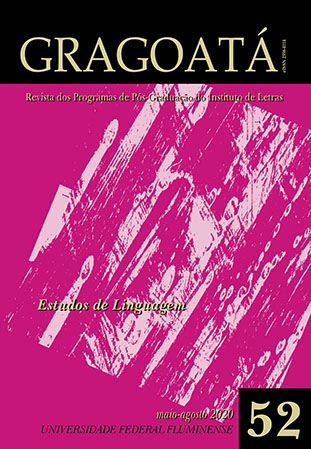O par construcional “acredita nisso/acredita isso”: distinção sintática no uso implica diferença semântico-pragmática
DOI:
https://doi.org/10.22409/gragoata.v25i52.36586Palavras-chave:
Gramática das Construções. Fictividade. Subjetividade. Intersubjetividade. Uso.Resumo
Este trabalho investiga, no par de construções gramaticais “acredita nisso/acredita isso”, distinções semântico-pragmáticas suscitadas por diferenças sintáticas e licenciadas por contextos discursivos específicos. Tendo em vista o arcabouço teórico da Linguística Cognitiva, representado aqui por autores como Almeida (2010), Croft e Cruse (2004), Ferrari (2011), Goldberg (1995, 2006), Langacker (1999, 2007), Pascual (2014) e Talmy (2000), postula-se que os usos de “acredita nisso”, comuns a contextos de contraexpectativa reiterada e contraposição local, abarcam uma perspectiva mais objetiva sobre a cena evocada, sendo que, ao acionar o frame de crença, o enunciador evoca-o para o outro; já os de “acredita isso”, comuns a contextos de contraexpectativa local, envolvem uma perspectiva mais subjetiva do enunciador sobre a cena evocada, sendo que, ao acionar o frame de perplexidade, o enunciador invoca-o para si em detrimento da reação do interlocutor. O termo antecedente anaforicamente retomado pelo pronome “nisso” perfila a concepção própria do enunciador, em perspectiva conjuntiva; ao passo que o termo antecedente anaforicamente retomado pelo pronome “isso” perfila a concepção do interlocutor, em perspectiva disjuntiva. Se o verbo “acreditar” estiver sob o escopo da negação, dá-se o oposto: “nisso” perfila a concepção do interlocutor; “isso” perfila a concepção própria do enunciador. As hipóteses foram levantadas com base em dados extraídos de sites em português na internet.
Downloads
Downloads
Publicado
Edição
Seção
Licença
AUTORIZAÇÃO
Autores que publicam em Gragoatá concordam com os seguintes termos:
Os autores mantêm os direitos e cedem à revista o direito à primeira publicação, simultaneamente submetido a uma licença Creative Commons Atribuição 4.0 Internacional (CC BY 4.0), que permite o compartilhamento por terceiros com a devida menção ao autor e à primeira publicação pela Gragoatá.
Os autores podem entrar em acordos contratuais adicionais e separados para a distribuição não exclusiva da versão publicada da obra (por exemplo, postá-la em um repositório institucional ou publicá-la em um livro), com o reconhecimento de sua publicação inicial na Gragoatá.
A Gragoatá utiliza uma Licença Creative Commons - Atribuição CC BY 4.0 Internacional.











